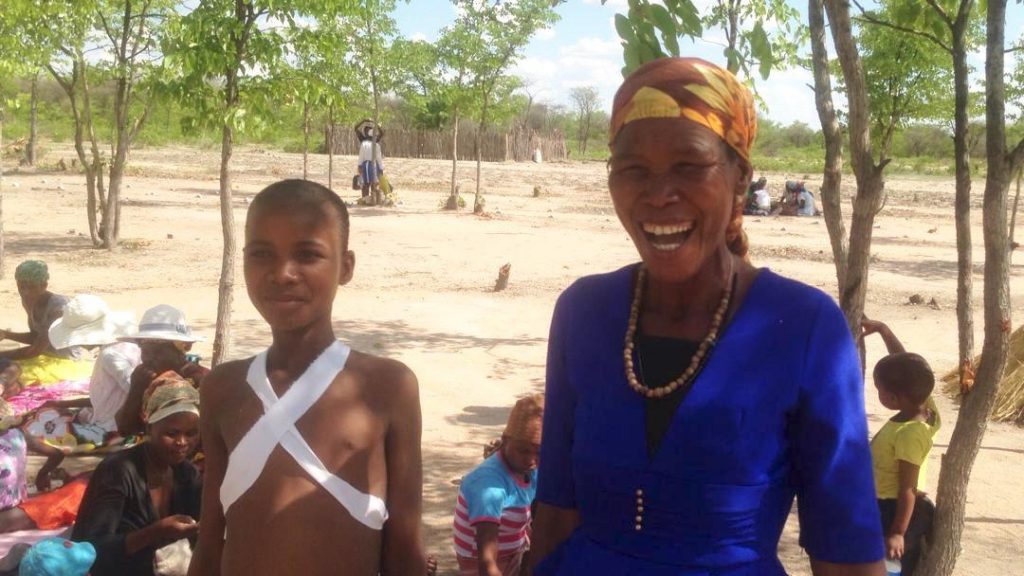The San language -Tshwao – is teetering on the brink of extinction as efforts to revive it seem to be hitting a brick wall.
Even though the Khoisan language is officially recognised in Zimbabwe’s constitution, less than 10 native speakers can speak the language, of which some are ‘uninterested’ in teaching others.
Without practice, linguists have said a native language can degrade from the speaker’s mind and if nothing is done to rectify the situation, the loss can be permanent.
The San community in Zimbabwe is mostly found in villages of Tsholotsho such as Ward 1 -Gariya, Ward 2 – Mtshina, Ward 7 – Gulalikabili, Ward 8 – Sanqinyana and Ward 10 -Sakhile who reportedly have adopted isiNdebele and TjiKalanga languages.
In an interview with CITE, Tsoro-tso-oo Development Trust director and a San community leader, Davy Ndlovu, lamented the dying efforts to revive the language.
“In 2013 when we started initiatives to revive Tshwao; we had 14 speakers who were very determined. We engaged government universities to assist in reviving this critically endangered language. At one point, the University of Zimbabwe came down to us and Lupane State University also showed interest then the Tshwao language initiative was born,” he said.
Ndlovu bemoaned that over time, the interest faded and eventually some native speakers died.
“Out of the 14 speakers, Gogo Motshwa, Balisi Moyo, Banini Moffat Moyo, Maxwell Ngcoli Sibanda and Msindo Moyo died. They were very active. Now only two people are interested and the others don’t care. They want to be paid. When you push them they question your interest and claim one will benefit while they remain poor,” he said.
Ndlovu said his organisation informed the government about those challenges but authorities “dragged their feet.”
“We lost the opportunity to revive the language when we had more native speakers. What pains me the most is that when we spoke about these challenges to everyone, the government included, no one cared,” said the community leader.
Ndlovu also accuses authorities of ‘only’ wanting Tshwao to be assigned status as a constitutionally recognised language to “brag the country has 16 official languages.”
Director of Communication and Advocacy in the Ministry of Primary and Secondary Education, Taungana Ndoro said on the teaching of the language at the schools in the area they were guided by the 2020 Global Education Monitoring Report that was hinged on Sustainable Development Goal Four that pushes for every child to have an inclusive and equitable quality education.
“The pledge is no one must be left behind in education and as a ministry we are trying to widen inclusive education to include all learners, regardless of disability, the poor, special needs, migrants, ethnicity, linguistics, race, rural, obese, boy, girl, depressed, those who work after school, the delinquent. Our education systems should accommodate all learners with their diversity and the goal is inclusivity. There might be gaps but we are doing our best, people must meet us halfway.
Ndoro added that “members of the San community should be encouraged to enrol in teaching colleges so they can be deployed to uplift their communities.”
The irony, according to the San community leader, was although Zimbabwe is the only country that recognised the Khoisan language, other countries such as Namibia and South Africa, which do not had done a lot to produce literature.
“They try to have the languages taught in schools but in Zimbabwe it’s another case. When you engage authorities about literature, they say, ‘develop it’ yet do not avail resources,” he bemoaned.
“The government pushed us to translate the constitution to the extent that we did so under very difficult circumstances considering this was a language that had no orthography and had to be developed at that time. We managed to translate but it was not perfect although we did our level best considering the situation.”
After the translation, Ndlovu indicated the government was ‘happy’ and researchers started writing academic papers but afterwards, “nobody cared about the language’s progress.”
“On a personal level, I created booklets as we wanted Tshwao taught in ECD centres. We even developed learning materials and a Tshwao language learning course for beginners. We started teaching it at John Landa High School but without resources – these efforts died,” he claimed.
Ndlovu said he developed an English – Tshwao dictionary to make it easier for translations but lacked resources to engage its native speakers.
“What is painful is you receive calls from people asking you to translate documents yet you are not paid anything. We were not even paid for our work translating the constitution. We had started translating syllabi but the work is tough, when you raise this, you are told, ‘it’s your language’ as they are only assisting,” Ndlovu said.
“People only think about Tshwao when there are documents or information to be translated. With Covid-19, they would come to you but at the end of the day you don’t even know what they want to do with that material. We informed them that right now there is no one who speaks the language, so even if we translate documents no one can be able to read and understand.”
When such issues are raised to authorities, Ndlovu said “you become a bad person.”
“With the outbreak of Covid-19, we stopped reaching out and now Tshwao is not even taught at primary schools so there are no young speakers at the moment.”
It is reported that over the past century alone, around 400 languages – about one every three months – have gone extinct, and most linguists estimated 50 percent of the world’s remaining 6 500 languages would be gone by the end of this century.

